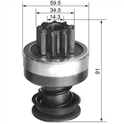Hey there! As a supplier of Bendix Drives, I often get asked about the torque rating of these nifty little components. So, I thought I'd take a few minutes to break it down for you and give you a better understanding of what it all means.
First off, let's talk about what a Bendix Drive is. For those of you who aren't familiar, a Bendix Drive is a type of overrunning clutch that's commonly used in starter motors. Its main job is to engage the starter motor's pinion gear with the engine's flywheel when you turn the ignition key. Once the engine starts, the Bendix Drive allows the pinion gear to disengage quickly, preventing the starter motor from being driven by the running engine.
Now, onto the torque rating. The torque rating of a Bendix Drive refers to the amount of torque, or rotational force, that the drive can handle without failing. It's an important specification because it determines how well the Bendix Drive can engage and disengage the pinion gear under different operating conditions.
There are a few factors that can affect the torque rating of a Bendix Drive. One of the most significant is the size and design of the drive itself. Larger Bendix Drives generally have higher torque ratings because they can handle more force. The materials used in the construction of the drive also play a role. Drives made from high-strength materials like steel or alloy are more likely to have higher torque ratings than those made from weaker materials.
Another factor that can impact the torque rating is the type of engine the Bendix Drive is being used with. Different engines have different starting requirements, which means they need a Bendix Drive with a specific torque rating. For example, a large diesel engine will require a Bendix Drive with a higher torque rating than a small gasoline engine because it takes more force to turn over the diesel engine's heavy flywheel.
So, how do you know what torque rating you need for your application? Well, it's a good idea to consult the manufacturer's specifications for your starter motor and engine. They should be able to provide you with the recommended torque rating for the Bendix Drive. If you're still unsure, you can also reach out to a professional mechanic or automotive expert for advice.
At our company, we offer a wide range of Bendix Drives with different torque ratings to meet the needs of various applications. Whether you're looking for a Starter Motor Gear Bendix Drive, a Dometic 310423209B Drive ASM, or a Car Starter Bendix, we've got you covered.
Our Bendix Drives are made from high-quality materials and are designed to provide reliable performance in even the toughest conditions. We take pride in offering products that meet or exceed industry standards, so you can trust that you're getting a top-notch Bendix Drive when you choose us as your supplier.


If you're in the market for a Bendix Drive, I encourage you to get in touch with us to discuss your specific needs. We can help you find the right drive with the appropriate torque rating for your application. Our team of experts is always here to answer your questions and provide you with the support you need to make an informed decision.
In conclusion, the torque rating of a Bendix Drive is an important specification that determines its ability to handle rotational force. By understanding the factors that affect the torque rating and choosing the right drive for your application, you can ensure that your starter motor operates smoothly and efficiently. If you have any further questions or would like to learn more about our Bendix Drives, don't hesitate to reach out. We're looking forward to working with you!
References
- Automotive Engineering Handbook, various editions
- Starter Motor Manufacturer's Manuals






